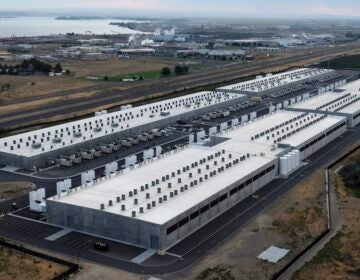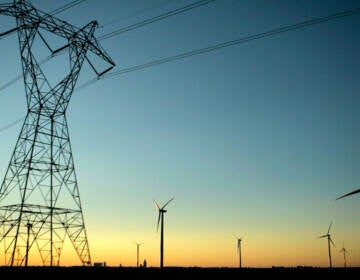Pennsylvania lawmakers grapple with how to handle demand for data centers
On Tuesday, Pennsylvania state lawmakers held a hearing with stakeholders to better understand how the state can prepare and manage the growth of data centers.

FILE - A data center owned by Amazon Web Services, front right, is under construction next to the Susquehanna nuclear power plant in Berwick, Pa., on Jan. 14, 2025. (AP Photo/Ted Shaffrey, file)
This story is part of the WHYY News Climate Desk, bringing you news and solutions for our changing region.
From the Poconos to the Jersey Shore to the mouth of the Delaware Bay, what do you want to know about climate change? What would you like us to cover? Get in touch.
Several Pennsylvania state lawmakers are clamoring at the prospects of building data centers to boost the local economy, as several have been planned or proposed for the state, including a 1 million-square-foot Amazon facility in Bucks County.
However, the prospect of increased tax revenue and job creation could come with a price. Data centers use a significant amount of energy and water, and environmentalists and residents are calling on legislators to ensure these facilities don’t harm natural resources or the electric grid. As rate hikes continue to soar in the region, residents are concerned a strain on the power grid could mean higher electric bills.
On Tuesday, state lawmakers held a hearing with stakeholders to better understand how the state can prepare and manage the growth of data centers.
“Data centers play an enormous role in the digital world we rely on every day — from health care to financial transactions to how we stay connected online. At the same time, they raise serious questions,” said state Sen. Marty Flynn, who represents Scranton and co-hosted the hearing.
“For Pennsylvania, the challenge is making sure the benefits are real and shared fairly while the costs and risks are managed responsibly,” he said. “Whatever direction we take, it must align with Pennsylvania’s long-term goals, economic, environmental and community alike.”
Data centers house the computer servers required to run internet services worldwide.
While they have been around since the mid-20th century, the acceleration of power-hungry artificial intelligence has boosted demand for the sites. AI requires more power at a faster rate than typical internet activities, straining the power grid, and leading to increased electricity rates for consumers.
In July, the Trump administration announced plans to accelerate AI development with limited regulatory oversight.
In June, Gov. Josh Shapiro announced his support for Amazon’s $20 billion investment in developing data centers across the state. The tech company will start with projects in Falls Township and in Salem Township in Luzerne County, creating an estimated 1,250 permanent jobs.
Pennsylvania also recently announced nearly $800 million in grants to connect state residents with high-speed internet.
Rising concerns over demand for electricity
A 2024 Department of Energy report on U.S. data center energy use estimated that data center load growth tripled over the past decade, and would double or triple again by 2028. Data center electricity usage is expected to climb from 58 terawatt-hours in 2014 to 176 terawatt-hours in 2023, according to the report, and is likely to increase again between 325 and 580 terawatt-hours by 2028.
Data center proponents say the facilities are essential for enabling connectivity and innovation across business and industry, creating hundreds of jobs and generating millions of dollars in tax revenue.
However, residents and environmental advocates have raised concerns about energy use and increased electricity bills.
While some data center operators have built their own power plants to generate energy, most of these facilities rely on the electrical grid, which in the Philadelphia region is managed by PJM Interconnection. Residents in the region have already been hit with increased energy bills, and PJM’s recent capacity auction — where power plants bid for rates in exchange for guaranteeing future supplies — resulted in an expectation that those rates will rise another 1.5% to 5%.
Though a 2023 Department of Energy Study said data centers amount to less than 5% of annual electricity use in the U.S., the same report indicates data centers will consume 6.7% to 12% of total U.S. electricity by 2028.
During the hearing, Pennsylvania Utility Commission Chairman Stephen DeFrank highlighted the need for a structured planning process when interconnecting data centers with the electric grid.
He said that if the companies launching data centers are able to build out some of the infrastructure on their own dime it could protect ratepayers.
“If we get people connected quicker and they’re doing the build out, we’re insulating the rate payer then from potential stranded costs,” DeFrank said.
Nicole Luciano, director of policy at the Energy Association of Pennsylvania, called on the state to ensure all users equitably share grid maintenance costs while streamlining the permitting processes for critical infrastructure.
“Data center customers should pay for the incremental grid costs they create while receiving credit for legitimate system benefits they provide,” she said. “This balanced approach protects rate payers from inappropriate subsidization while maintaining fair treatment that supports economic development.”
The cost of data centers on the water supply
Not only do data centers consume a significant amount of energy, they also require substantial water consumption to cool servers that are at risk of overheating. Larger data centers can consume up to 5 million gallons of drinking water per day and, in some areas, have drained resident’s well water supplies.
Water usage can increase during the summer months, coinciding with increased residential use as people fill their swimming pools and water their yards and gardens, said Tony Nokovich, vice president of engineering at Pennsylvania American Water.
That means water providers would be required to construct facilities to meet the needs of these peaks, Nokovich said during the hearing. The large volume of water required to cool data centers can also stress water distribution infrastructure, he said.
Larger water providers such as Pennsylvania American Water are positioned to manage the stress, Nokovich said, but smaller water utilities may not be able to invest in infrastructure upgrades. He stressed the importance of placing data centers in areas where dependable water service is available.
Data centers can also require large transmission mains and storage tanks, which could cause water to become stagnant during cooler months, leading to low chlorine residual issues, Nokovich said.
Pennsylvania American Water is able to work with the needs of data centers, he said, as long as these facilities pull their weight.
“Data centers should pay the costs associated with the development and infrastructure upgrades necessary to serve them, so our customers do not foot the bill for the investments that they do not benefit from,” Nokovich said.
Organizations representing local governments also stressed the importance of local zoning laws and regulations. They expressed their concerns about state legislation that aims to transfer land use authority from local municipalities to an energy board in order to fast-track data center projects. A separate piece of legislation also aims to speed up the permitting process for data while restricting local zoning.
“Faster isn’t better if rights are trampled,” said Holly Fishel with the Pennsylvania State Association of Township Supervisors, pointing to water usage as a top concern.
“Townships must ensure that the developer has documented an adequate water supply that will not leave residents unable to use their homes and businesses if water supplies go dry and require the township to truck in water for daily use,” she said.
State Rep. Kyle Mullins, who represents Lackawanna County, called for state law that guides where data centers can be built, and that protects the state’s water supply and power grid.
“These centers should be required to adopt best practices when it comes to noise mitigation and water use,” he said. “And there must be protection in place to ensure that no data center costs fall on electricity customers.”

Get daily updates from WHYY News!
WHYY is your source for fact-based, in-depth journalism and information. As a nonprofit organization, we rely on financial support from readers like you. Please give today.







